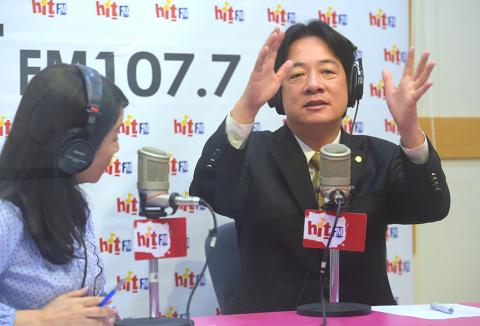Tainan Mayor William Lai (賴清德) yesterday described the nation’s relationship with China as one between friends, but added that he advocates Taiwanese independence.
Lai, a member of the Democratic Progressive Party (DPP), said his stance on cross-strait relations is clear, which is in favor of “Taiwanese independence and that stance will not change no matter what position I hold.”
However, he said his attitude toward China is friendly and his strategy is flexible, adding that he would seek common ground and put aside differences in cross-strait exchanges to enhance bilateral understanding.

Photo: Chang Chia-ming, Taipei Times
He was asked during a radio interview about the differences between his approach to China and that of Taipei Mayor Ko Wen-je (柯文哲), an independent.
Both mayors have made friendly remarks about China over the past few weeks.
Lai spoke of “feeling an affinity toward China while loving Taiwan,” while Ko, during a visit to Shanghai to attend a twin-city forum, said “both sides are of a family.”
Lai yesterday said Ko defined cross-strait ties as a relationship between a couple, while he defined them as between friends.
What they have in common is that neither accepts the so-called “1992 consensus,” Lai said.
The “1992 consensus” — a term former Mainland Affairs Council chairman Su Chi (蘇起) admitted making up in 2000 — refers to a tacit understanding between the Chinese Nationalist Party (KMT) and the Chinese government that both sides acknowledge there is “one China,” with each side having its own interpretation of what “China” means.
“Taiwanese independence is the broadest consensus in Taiwanese society,” Lin said.
The “1992 consensus” and the efforts to have the DPP abandon its pro-independence platform or sign a cross-strait peace agreement are all ploys used by China to divide Taiwan with the aim of annexing the nation, Lai said.
He also described cross-strait relations as international relations and said that when deciding on the nation’s direction, the goal should be maximizing the welfare of the public rather than moving within boundaries set by big powers.
“China is not to be feared. What is to be feared is that we cannot unite,” he said.
Regarding former president Ma Ying-jeou’s (馬英九) remark that Chinese authorities “will not accept or be happy with” Lai feeling an affinity toward China while loving Taiwan, Lai said the remark reflected Ma’s problem.
“Ma cares too much about whether China is happy and ignores the will of Taiwanese,” Lai said.

The Ministry of Economic Affairs has fined Taobao NT$1.2 million (US$36,912) for advertisements that exceed its approved business scope, requiring the Chinese e-commerce platform to make corrections in the first half of this year or its license may be revoked. Lawmakers have called for stricter enforcement of Chinese e-commerce platforms and measures to prevent China from laundering its goods through Taiwan in response to US President Donald Trump’s heavy tariffs on China. The Legislative Yuan’s Finance Committee met today to discuss policies to prevent China from dumping goods in Taiwan, inviting government agencies to report. Democratic Progressive Party Legislator Kuo Kuo-wen (郭國文) said

The Ministry of Economic Affairs has fined Taobao NT$1.2 million (US$36,900) for advertisements that exceeded its approved business scope and ordered the Chinese e-commerce platform to make corrections in the first half of this year or its license would be revoked. Lawmakers have called for stricter supervision of Chinese e-commerce platforms and more stringent measures to prevent China from laundering its goods through Taiwan as US President Donald Trump’s administration cracks down on origin laundering. The legislature’s Finance Committee yesterday met to discuss policies to prevent China from dumping goods in Taiwan, inviting government agencies to report on the matter. Democratic Progressive Party

Taiwan and its Pacific ally Tuvalu on Tuesday signed two accords aimed at facilitating bilateral cooperation on labor affairs, according to Taiwan’s Ministry of Foreign Affairs (MOFA). The governments inked two agreements in Taipei, witnessed by Foreign Minister Lin Chia-lung (林佳龍) and visiting Deputy Tuvaluan Prime Minister Panapasi Nelesone, MOFA said in a news release. According to MOFA, the agreements will facilitate cooperation on labor issues and allow the two sides to mutually recognize seafarers’ certificates and related training. Taiwan would also continue to collaborate with Tuvalu across various fields to promote economic prosperity as well as the well-being of their

Sung Chien-liang (宋建樑), who led efforts to recall Democratic Progressive Party (DPP) Legislator Lee Kun-cheng (李坤城), was released on bail of NT$80,000 today amid outcry over his decision to wear a Nazi armband to questioning the night before. Sung arrived at the New Taipei District Prosecutors’ Office for questioning in a recall petition forgery case last night wearing a red armband bearing a swastika, carrying a copy of Adolf Hitler’s Mein Kampf and giving a Nazi salute. Sung left the building at 1:15am without the armband and covering the book with his coat. Lee said today that this is a serious